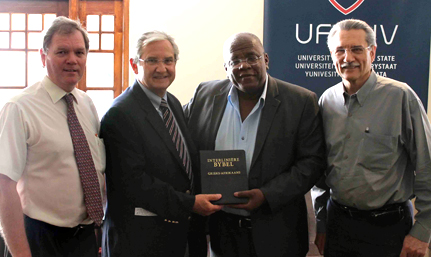 |
At the event were, from the left: Prof. Francois Tolmie, Mr Chris Johnsen, Prof. Jonathan Jansen and Prof. Hermie van Zyl.
07 December 2012 |
Prof. Jonathan Jansen, Vice Chancellor and Rector of the university, received a copy of the new Interlinear Bible in Greek and Afrikaans from members of staff of the Faculty of Theology and CUM book publishers. The Bible was given to Prof. Jansen by Mr Chris Johnsen from CUM books.
The Greek and Afrikaans Interlinear Bible is a translation containing the original Greek text as well as a literal Afrikaans translation.
This Bible is the culmination of a project started seven years ago by a team of nine theologians including the Dean of the Faculty of Theology, Prof. Francois Tolmie as well as other faculty members, Prof. Hermie van Zyl and Prof. Pieter de Villiers. Mr Johnsen lauded the staff for their “tremendous contribution” to the project. With this edition, South Africa becomes the seventh country in the world to publish an Interlinear Bible.
“The departure point of this version is not a translation, it is the Greek text,” Mr Chris Johnsen said about the aim of this new work. Prof. Tolmie agreed with the publisher, saying this Bible is meant for people who do not have access to the Greek text and who want to understand it.
Prof. Jansen thanked all involved for his copy, noting the important role belief is playing in his own life as well as his work on campus.